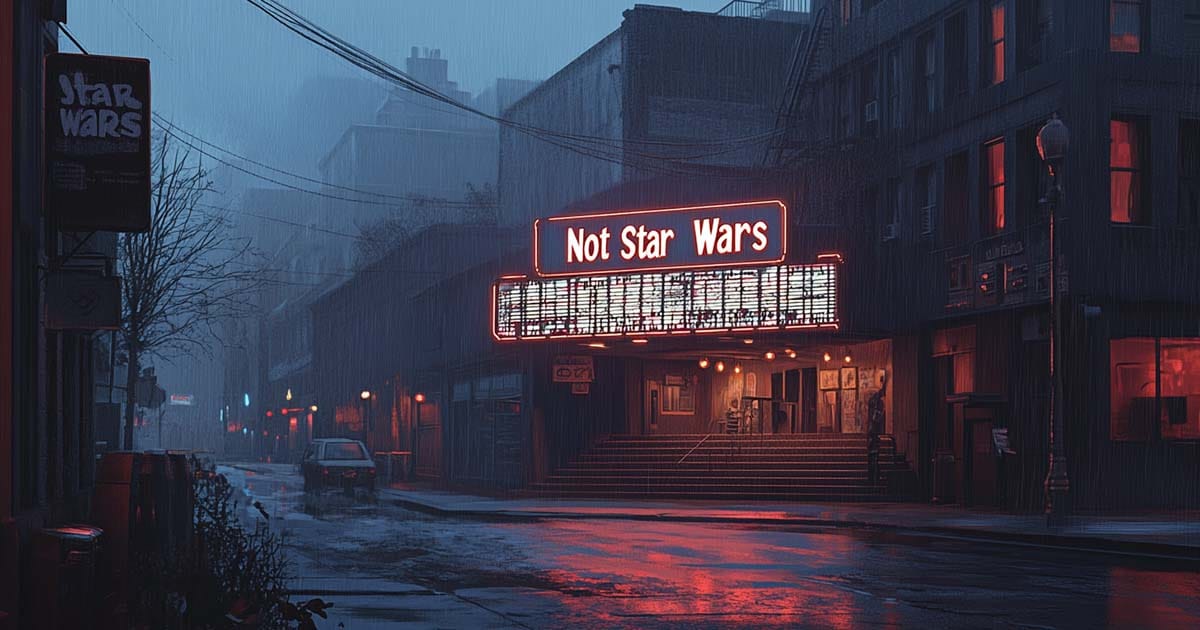What if "Star Wars" Had Never Been Made?
Imagine a world without "Star Wars." No space operas, fewer sci-fi blockbusters, and delayed special effects innovation. Explore how sci-fi cinema would have evolved differently.

When George Lucas's "Star Wars" debuted in 1977, science fiction films were forever changed. Its groundbreaking special effects, mythic storytelling, and unprecedented commercial success redefined both the genre and Hollywood itself. But what if "Star Wars" had never been made?
Without its influence, science fiction—and popular cinema as a whole—would likely look very different today. Here's a glimpse at how things might have unfolded in a world without "Star Wars."
The Decline of Space Opera
Before "Star Wars," space operas were a rarity in film. Big-budget science fiction leaned toward cerebral or dystopian tales like "2001: A Space Odyssey" and "Planet of the Apes." Without "Star Wars," which blended adventure and myth in a space-faring context, Hollywood might have largely abandoned space operas. Films like "Guardians of the Galaxy" and "Dune" might never have seen mainstream success.
Special Effects Development Delayed
Industrial Light & Magic (ILM), founded by George Lucas to create "Star Wars," drove significant advances in practical effects, model work, and later, computer-generated imagery (CGI).
Without ILM's contributions, the pace of special effects innovation could have slowed significantly. Films like "Terminator 2" and "Jurassic Park," which relied on cutting-edge effects, might have been delayed by years.
Science Fiction as Niche Entertainment
"Star Wars" transformed science fiction from niche entertainment into a mass-market phenomenon. Without it, sci-fi might have remained a genre primarily for hardcore fans and intellectuals. Studios would likely have been reluctant to invest in large-scale, effects-driven sci-fi films, leaving stories like "The Matrix" and "Inception" as potential outliers rather than cultural landmarks.
The "Star Trek" Cinematic Universe Grows Faster
In a world without "Star Wars," "Star Trek" could have become the dominant space-based franchise (if it is not already). The release of "Star Trek: The Motion Picture" in 1979 was partly driven by the success of Lucas's saga. Without "Star Wars" overshadowing it, "Star Trek" might have developed a more ambitious and interconnected cinematic universe earlier, influencing sci-fi storytelling in different ways.
Hollywood's Blockbuster Model Changes
"Star Wars" pioneered the modern blockbuster model, combining wide theatrical releases with extensive marketing and merchandising. In its absence, Hollywood's focus on summer tentpoles might have evolved more slowly. Other genres, such as Westerns or crime dramas, might have retained more prominence, and the trend of mega-franchises could have emerged later or under different circumstances.
The Mythic Hero's Journey in Cinema
Lucas drew heavily from Joseph Campbell's "hero's journey," creating a timeless narrative arc that became a template for countless films. Without "Star Wars," this structure might not have influenced blockbusters to the same extent. Movies like "The Matrix," "Harry Potter," and "Lord of the Rings" might have employed different narrative frameworks, altering their cultural impact.
Fewer Multimedia Franchises
"Star Wars" demonstrated the viability of multimedia storytelling, with comics, novels, toys, and animated series expanding its universe. In its absence, studios might have been slower to embrace this model. Franchises like "Marvel's Cinematic Universe" and "Harry Potter" could have lacked early examples to follow, potentially limiting their scope.
The Loss of Cultural and Generational Impact
Beyond its technical and narrative innovations, "Star Wars" created a shared cultural experience across generations. It inspired countless creators, scientists, and dreamers with its imaginative world-building. Without this unifying touchstone, science fiction's cultural footprint might have been more fragmented, with fewer stories capturing the public imagination on a grand scale.
The Lack of an Expanded Sci-Fi Aesthetic
The "used future" aesthetic of "Star Wars" broke from the pristine, utopian visions common in earlier science fiction. Its gritty, lived-in look influenced films like "Blade Runner" and "The Mandalorian." Without this aesthetic shift, sci-fi films might have continued portraying sleek, sterile environments, reducing the genre's visual diversity.
Filmmakers' Inspirations Shift
Directors such as James Cameron, Christopher Nolan, and J.J. Abrams have cited "Star Wars" as a pivotal influence. Without it, their creative trajectories might have been drastically different. Cameron's "Avatar," Nolan's "Interstellar," and Abrams's "Star Trek" reboot might not exist in their current forms, reshaping modern sci-fi cinema.
We need "Star Wars"
"Star Wars" was more than a blockbuster; it was a catalyst that reshaped the science fiction genre and Hollywood itself. Without it, the modern landscape of sci-fi films might have been less adventurous, less visually ambitious, and more niche. While science fiction would undoubtedly have continued to evolve, the absence of "Star Wars" would have created a very different cinematic universe—one perhaps less attuned to the epic scope and mythic power that have come to define the genre.

